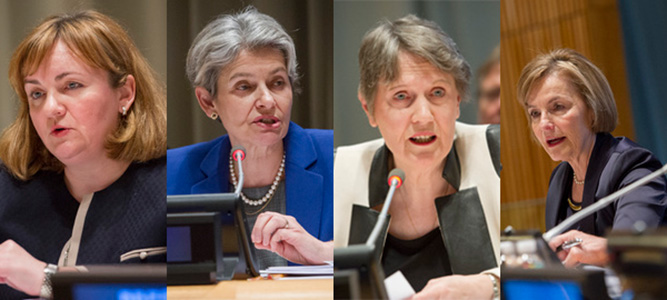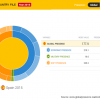
After a succession of eight men it seems the time may have come for one of the most difficult diplomatic jobs on the planet, that of UN Secretary-General, to go to a woman. The Danish diplomat Mogens Lykketoff, current (until September) President of the General Assembly –the body charged with choosing the new Secretary-General– endorses the idea of a woman and has put forward a good description of the post’s requirements: its holder should be “a strong and independent personality” and “have contact with global public opinion and authority to call on the major and minor powers to act in a timely manner”. After the monochrome Ban Ki-moon, who has nevertheless pulled off certain successes, someone with charisma is needed. His predecessor, the Ghanaian Kofi Annan, possessed it and managed to turn himself into something akin to an expression of a global conscience.
The UN Secretary-General is chosen, normally by acclamation, by the General Assembly on the ‘recommendation’ of the Security Council. But the selection process is different this time, and not just because the idea of appointing a woman is gaining momentum, given that women make up half of the planet’s 7,200 inhabitants. It is also because, in the middle of April, for the first time in the now long history of the organisation, the nine candidates who put themselves forward were subjected to the scrutiny not only of the 193 States comprising the General Assembly, but also by the world’s citizens, who submitted questions via social networks. It is another manifestation of ‘global governance from below’, mentioned previously in these columns. The idea of a woman is backed by the ‘1 for 7 billion’ campaign endorsed by, among others, the World Federation of United Nations Associations.
But those at the top also matter, namely the five permanent members of the Security Council and three of these in particular –the US, Russia and China–, which in this case wield a de facto, if not official, veto. If there is a large majority in the Assembly in favour of one candidate, the veto or imposition of the Security Council will be much more difficult, but as things stand the high number of candidates may lead to the decision being imposed by the Council. In principle the decision must be taken in September, so that the new Secretary-General’s term can start in January, almost coinciding with that of the new US President, who could also be a woman for the first time.
The second factor is the custom (not always respected) of taking turns to reflect the global regions the candidates hail from. Eastern Europe is one of the regions that have never held the post. But Eastern Europe is a geographical concept, a relic of the Cold War that no longer represents anything, what with some of its components having joined or hoping to join the EU and NATO –simply being labelled as Eastern European bothers them– or the Commonwealth of Independent States or having been left in limbo. This accounts for the fact that Helen Clark, former Prime Minister of New Zealand and currently head of the United Nations Development Programme, has thrown her hat into the ring. Her sex, her merits and her membership of the Anglosphere give her a reasonable chance. Antonio Guterres, former Prime Minister of Portugal and one-time UN High Commissioner for Refugees, has also put himself forward; Spain will support him, as a neighbour should, if he stays in the race (unless the new Argentine Minister Susana Malcorra also decides to run).
There are candidates from Eastern Europe with political clout, such as Irina Bokova, former Foreign Minister of Bulgaria and Director-General of UNESCO, sponsored by the former government of Bulgaria, which has since changed. But she is competing with another female Bulgarian who is closer to the current executive in Sofia, Kristina Georgieva, Vice-President of the European Commission (something that may irritate a Russia being sanctioned by the EU). The other two European women are the Croat, Vesna Pusić, and the Moldovan, Natalia Gherman. In addition to Guterres, the men in the contest are Vuk Jeremic, former Minister of Serbia and one-time President of the General Assembly; Danilo Türk, former President of Slovenia and former Assistant Secretary-General of the UN; and Srgjan Kerim from the former Yugoslav Republic of Macedonia. And, from outside the region, Kevin Rudd, the former Prime Minister of Australia (who speaks Chinese).
And the German chancellor, Angela Merkel, continues to be mentioned, but it seems that in the present circumstances she neither wants nor is able to leave the Chancellery in Berlin.
The UN needs a strong Secretary-General, someone who can avoid becoming what the Burmese diplomat U Thant, holder of the post between 1961 and 1971, described as a ‘glorified functionary’. But personality will not suffice if the member States do not supply the office-holder and an organisation crying out for reform with the necessary resources. These are in short supply, as is abundantly clear from the refugee crisis in Syria.


